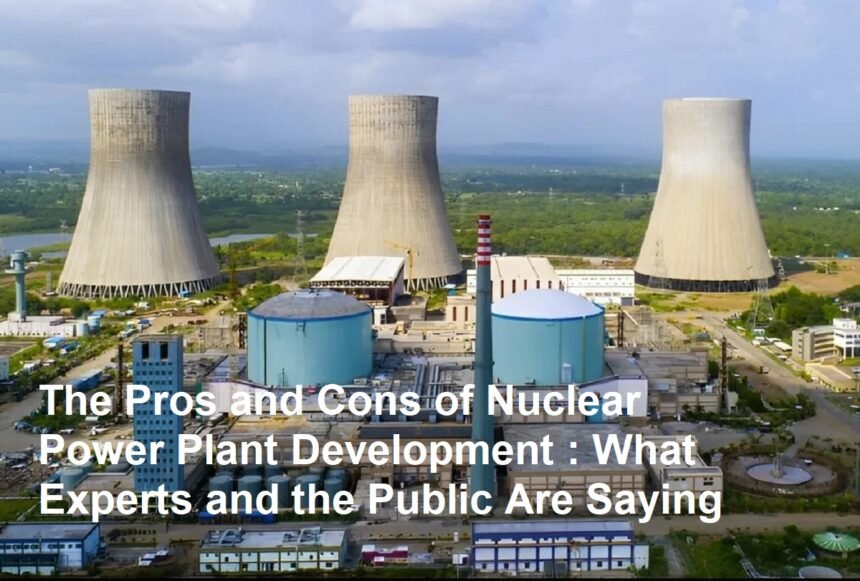Why Is the Topic of Nuclear Power Plants Getting More Attention?
Lately, the plan to build nuclear power plants (NPPs) in Indonesia has become a hot topic. The government is eyeing nuclear energy as a long-term solution to the energy crisis and a move away from fossil fuels.
But… like any major technology, NPP development brings along its fair share of pros and cons. Some people fully support it for its efficiency and environmental benefits, while others worry about its potential risks.
Let’s break it down!
Pros and Cons of Nuclear Power Plant Development
What Is a Nuclear Power Plant?
Before jumping into the pros and cons, it’s important to understand what an NPP actually is.
An NPP is a facility that generates electricity through nuclear reactions, specifically fission (splitting atoms). Compared to coal-based power plants, nuclear energy produces very low carbon emissions. However, the risks can’t be ignored.
The Benefits of Building NPPs
1. Stable and Efficient Energy Supply
NPPs can produce large amounts of energy consistently, unlike renewable sources like solar and wind that depend on the weather.
Expert opinion: Dr. Iwan Setiawan, a nuclear energy expert from BATAN, said, “Nuclear energy has extremely high energy density. Just one gram of uranium can produce as much energy as three tons of coal.”
2. Environmentally Friendly
Nuclear plants do not emit direct carbon emissions like fossil-fuel plants do. This is a big plus in fighting climate change.
3. A Long-Term Solution
Nuclear energy sources can last for decades. If managed safely and efficiently, this could be a sustainable energy solution for the future.
The Risks and Public Concerns
1. Risk of Leaks and Accidents
Disasters like Chernobyl and Fukushima have left lasting impressions. The fear of radioactive leaks is the biggest concern.
Public response: Many residents oppose the idea of having NPPs near residential areas. For instance, locals in Jepara, the proposed site for the Muria NPP, expressed concerns over health and safety risks.
2. Radioactive Waste
The by-products of nuclear reactions are highly toxic and require special handling for hundreds—even thousands—of years.
3. Lack of Skilled Workforce and Infrastructure
Building an NPP requires experts and robust safety systems. Indonesia still has a lot to prepare in this regard.
Expert Opinions: Should We Really Be Afraid?
Some experts believe that fear of nuclear power stems more from misinformation than the actual risks.
According to Prof. Rini Suryati from ITB, “If managed according to international standards, nuclear is one of the safest energy sources. Even Japan, which experienced a nuclear disaster, still operates several of its plants.”
However, she also emphasized the importance of public education. “Transparency and community involvement are key,” she added.
Public Reactions: Mixed and Still Divided
Most People Still Feel Uneasy
Independent research surveys show that about 60% of Indonesians are either opposed or unsure about NPP development. The reasons? Safety concerns and a lack of communication from the government.
But Some Are Starting to Support
Some communities, especially those who have received proper information and education, are beginning to accept the idea—especially as electricity costs rise and fears of an energy crisis grow.
Practical Tips to Understand the Nuclear Issue Objectively
1. Find Trusted Information Sources
Don’t rely solely on social media. Follow expert discussions, read scientific publications, and stay updated on national energy policies.
2. Understand Local Context
Each country has different conditions. What works in France may not work in Indonesia. So consider our geographic, social, and technological readiness.
3. Join Public Discussions
If there are public forums or webinars on nuclear energy, attend them. These are great opportunities to ask questions and express your views directly to experts.
4. Push for Government Transparency
Public involvement is crucial. Make sure the government offers open dialogue and easy access to relevant information.
Conclusion: Promising, But Must Be Handled with Care
The development of nuclear power plants holds great potential for Indonesia’s energy future. However, the pros and cons of nuclear power plant development must be weighed carefully.
Expert opinions suggest that nuclear power is safe when managed properly. But public responses—especially concerns over safety and waste—are valid and need to be addressed.
What’s Your Opinion?
So, what do you think? Is Indonesia ready to build nuclear power plants?
Share your thoughts in the comments or pass this article along to friends! The more people get involved, the wiser our collective decisions will be.












